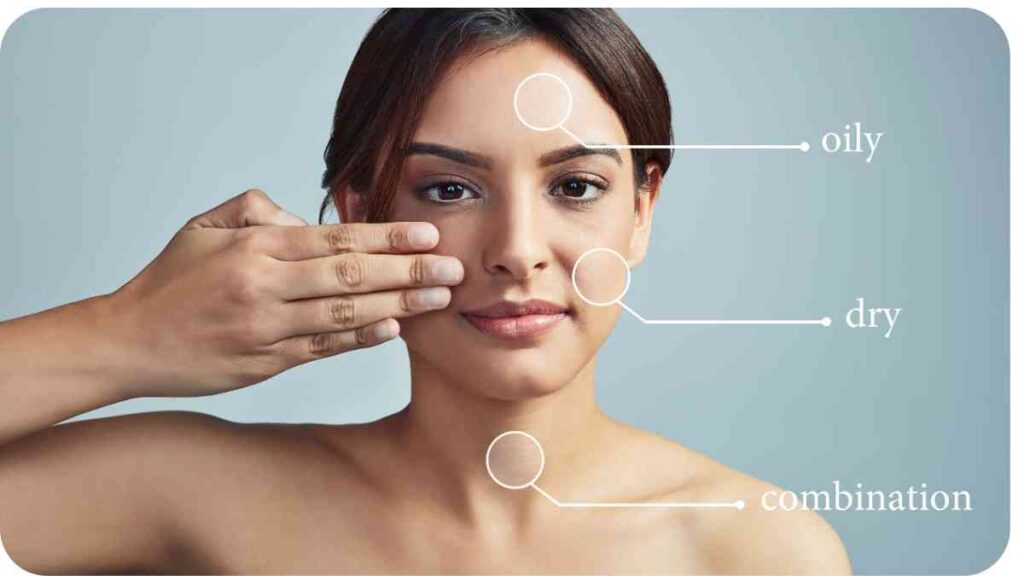Welcome to our exploration of an intriguing question: “Does Your Skin Type Change?” Our skin plays a vital role in protecting our bodies while also reflecting our overall health. Understanding the dynamics of different skin types is crucial for maintaining healthy and radiant skin.
In this article, we will delve into the subject, shedding light on the factors that can influence changes in your skin type. We will equip you with the knowledge and insights needed to adapt your skincare routine effectively. So, let’s embark on this journey to discover the truth behind the ever-changing nature of our skin!
| Takeaway |
|---|
Your skin type can change over time due to various factors such as hormones, aging, and environmental influences. |
| Pay attention to signs of change in your skin type, including increased sensitivity or shifts in oiliness, and adjust your skincare routine accordingly. |
| Maintaining proper hydration and moisture balance is crucial for all skin types. Drink enough water and use suitable moisturizers for your specific needs. |
| Protect your skin from environmental stressors like UV radiation by wearing sunscreen daily and adjusting your skincare routine based on the climate you’re in. |
| Regularly examine your skin for any unusual spots or changes in texture, and consult a skincare professional if you notice anything concerning. |
Understanding Skin Types

Definition of Skin Type
Before we delve deeper into the topic, let’s establish what we mean by “skin type.” In simple terms, your skin type refers to the characteristics and behaviors exhibited by your skin. These traits can include factors such as oiliness, dryness, sensitivity, and more. Identifying your skin type is essential as it helps determine the most suitable skincare products and routines for your needs.
Achieve clear skin with effective acne solutions that target blemishes without compromising on skincare essentials. Embrace a radiant complexion with our carefully curated selection.
Categories of Skin Types
There are generally four main categories of skin types: normal, oily, dry, and combination. Understanding which category your skin falls into will help you effectively care for its unique needs.
- Normal Skin: This skin type is well-balanced, with adequate moisture and a healthy complexion. Lucky are those who possess it!
- Oily Skin: People with oily skin tend to have an excess production of natural oils. This can lead to issues like acne, shininess, and enlarged pores.
- Dry Skin: Dry skin is characterized by a lack of moisture and oil production. It often feels tight, appears dull, and may be more prone to sensitivity and flakiness.
- Combination Skin: As the name suggests, combination skin is a mix of both oily and dry areas. Typically, the T-zone (forehead, nose, and chin) tends to be oilier, while the cheeks and other areas may be drier.
Determining Your Skin Type
To identify your skin type accurately, observe how your skin behaves throughout the day and in varying conditions. Consider the following factors when evaluating your skin:
- Shine: Is your skin usually shiny or oily in appearance?
- Texture: Does it feel smooth, rough, or uneven?
- Moisture: Does your skin seem adequately hydrated or dry?
- Sensitivity: Do you experience any itchiness, redness, or reactions to certain products?
- Pore Size: Are your pores more visible or larger in certain areas of your face?
By analyzing these aspects, you can gain a better understanding of your skin’s characteristics and determine your skin type.
Embark on a journey towards radiant and clear skin by following our comprehensive skincare routine. Discover the secrets to maintaining a bright and flawless complexion every day.
Common Skin Concerns
In addition to different skin types, it’s essential to be aware of common skin concerns that can affect anyone, regardless of their skin type. These concerns include acne, wrinkles, hyperpigmentation, sensitivity, and inflammation. Understanding these challenges will help us address them effectively throughout this article.
Can Your Skin Type Change?

Now comes the intriguing question: Can your skin type change over time? The answer is both yes and no. There are certain factors that can cause variations in your skin type, while some aspects remain constant.
Factors Influencing Skin Type
Several factors can contribute to changes in your skin type, including hormonal changes, environmental influences, aging, and lifestyle choices. Let’s explore these factors in more detail to gain a deeper understanding.
Indulge your skin with hydration and care through our expertly crafted skincare routine. Uncover the key steps to achieving perfectly hydrated and nourished skin for a youthful glow.
Hormonal Changes
Hormonal fluctuations, such as those experienced during puberty, pregnancy, or menopause, can impact your skin type. For example, individuals with oily skin may experience increased dryness during menopause, while those with dry skin may notice increased oiliness during pregnancy. These changes occur due to hormonal imbalances that affect oil production levels and overall skin behavior.
Environmental Factors
Environmental factors, such as climate, pollution levels, and exposure to sun, can also impact your skin type. Living in a humid environment may make oily skin appear even oilier, while
dry skin may become drier in arid conditions.
Exposure to ultraviolet (UV) radiation from the sun can also affect your skin type, leading to increased oil production or dryness. Additionally, pollutants in the air can clog pores and contribute to skin issues.
Experience a transformation with our skincare secrets designed to bring out your natural radiance. Follow our guide to unveil a brighter and more luminous complexion in just seven days.
Aging and Skin Type
As we age, our skin undergoes natural changes that can affect its behavior and appearance. The production of collagen and elastin, proteins responsible for maintaining skin elasticity, decreases over time, leading to wrinkles and sagging.
These age-related changes can also influence your skin type. For instance, individuals with oily skin may notice a reduction in oil production, resulting in a drier complexion. On the other hand, those with dry skin may experience increased oiliness due to changes in their skin’s moisture barrier.
Signs Indicating a Change in Skin Type
Now that we understand the factors that can contribute to changes in skin type, let’s explore the signs that indicate such changes are occurring. Paying attention to these signs will help you make informed decisions about adjusting your skincare routine.
Increased Sensitivity
If you find that your skin has become more reactive and sensitive to certain products or ingredients that previously didn’t cause any issues, it could be a sign of a change in your skin type. Heightened sensitivity may manifest as redness, itching, or irritation upon using specific skincare products or even environmental triggers.
Combat hair fall with insights and remedies that address the root causes. Discover effective tips and remedies to promote healthy hair and minimize the impact of hair fall on your tresses.
Oily Skin Becoming Dry
If you have always had oily skin but notice that it feels drier than usual, it may indicate a change in your skin type. This shift can occur due to factors like hormonal fluctuations, aging, or changes in your skincare routine. Adjusting your products and incorporating hydrating ingredients into your regimen can help rebalance your skin’s moisture levels.
Dry Skin Becoming Oily
Similarly, individuals with dry skin might observe an increase in oiliness. This shift can be caused by hormonal changes, environmental conditions, or the use of heavy, pore-clogging products. Ensuring proper cleansing and using lightweight, oil-free moisturizers can help manage excess oil while maintaining hydration.
Changes in Tolerance to Products
In some cases, you may find that products you used to love and that worked well for your skin no longer yield the same results. This change in product tolerance can indicate a transformation in your skin type or its needs. Experimenting with new formulations or consulting with a skincare professional can help you find suitable alternatives that cater to your evolving skin concerns.
Maintaining Healthy Skin

Understanding the dynamics of skin types and recognizing when changes occur is crucial for effective skincare. Here are some tips and insights to help you maintain healthy, vibrant skin amidst such changes.
Appropriate Skincare Routine
Adapting your skincare routine to meet your changing needs is essential. For example, if your skin is transitioning from oily to dry, consider incorporating richer moisturizers and hydrating serums. Conversely, if your skin is becoming oilier, opt for lightweight, oil-free products to avoid clogging pores. Cleansing twice daily, exfoliating gently, and using sunscreen daily are practices that benefit all skin types.
Hydration and Moisture Balance
Regardless of your skin type, maintaining proper hydration is key. Drink an adequate amount of water daily to keep your skin hydrated from within.
Additionally, using moisturizers and hydrating serums formulated for your specific skin type can help restore and maintain moisture balance. Look for ingredients like hyaluronic acid, glycerin, and ceramides that provide hydration and support the skin’s barrier function.
Protection from Environmental Stressors
Shielding your skin from environmental stressors is crucial for overall skin health. Ensure you wear sunscreen with at least SPF 30 daily, even on cloudy days, to protect against harmful UV rays. Consider the climate and adjust your skincare routine accordingly. For instance, in dry conditions, using a humidifier can help counteract moisture loss.
Regular Skin Checks and Professional Advice
Keep a close eye on how your skin behaves and monitor any changes. Regularly examine your skin for unusual spots, moles, or changes in texture. If you notice anything concerning, consult a dermatologist or skincare professional for a proper evaluation. They can provide personalized advice and recommend suitable treatments or adjustments to your skincare routine.
Conclusion
Your skin type serves as a foundation for understanding your skin’s unique needs. While some aspects of your skin type remain constant, various factors can cause changes over time. Hormonal changes, environmental influences, and aging all play a role in shaping your skin type.
Identifying signs of change, such as increased sensitivity or shifts in oiliness, allows you to adapt your skincare routine accordingly. By establishing a suitable skincare regimen, emphasizing hydration, protecting against environmental stressors, and seeking professional advice when needed, you can maintain healthy, glowing skin throughout life’s transitions.
Remember, taking care of your skin is an ongoing journey of self-discovery and empowerment. Stay attuned to your skin’s needs, embrace positive changes, and enjoy a lifetime of radiant and confident skin!
Table: Skincare Products for Different Skin Types
To make it easier for you to find the right skincare products for your specific skin type, here are some recommendations:
| Skin Type | Cleanser | Moisturizer | Sunscreen | Serum |
|---|---|---|---|---|
| Normal | Gentle foaming cleanser | Lightweight moisturizer | Broad-spectrum SPF 30+ | Hydrating antioxidant |
| Oily | Gel or foaming cleanser | Oil-free moisturizer | Non-comedogenic SPF 30+ | Mattifying or pore-refining |
| Dry | Cream or oil cleanser | Rich moisturizer | Moisturizing SPF 30+ | Hydrating or nourishing |
| Combination | Gel or foaming cleanser | Light hydrating moisturizer | Broad-spectrum SPF 30+ | Balancing or hydrating |
| Sensitive | Fragrance-free cleanser | Gentle and soothing moisturizer | Mineral-based SPF 30+ | Calming or soothing |
Remember, these are just general recommendations, and it’s essential to experiment and find what works best for your skin. Pay attention to ingredient lists and choose products that are formulated to address your specific concerns.
Table: Tips for Maintaining Healthy Skin
Here are some additional tips to help you maintain healthy skin throughout your skincare journey:
| Tip | Description |
|---|---|
| Cleanse twice daily | Wash your face morning and evening to remove dirt, oil, and impurities. |
| Exfoliate gently | Use a mild exfoliator once or twice a week to slough off dead skin cells and promote cell renewal. |
| Stay hydrated | Drink plenty of water to keep your skin hydrated and supple from within. |
| Eat a balanced diet | Nourish your skin by consuming a variety of fruits, vegetables, and nutrients. |
| Protect from the sun | Wear sunscreen with at least SPF 30 daily and seek shade during peak sun hours. |
| Practice stress management | High-stress levels can affect your skin, so find healthy ways to manage stress. |
| Get enough sleep | Aim for 7-8 hours of quality sleep every night to support skin rejuvenation. |
| Be gentle with your skin | Avoid harsh scrubbing or pulling on the skin, as it can cause damage and irritation. |
| Listen to your skin | Pay attention to how your skin reacts to products and adjust your routine accordingly. |
| Consult a skincare professional | If you’re unsure about your skin type or need personalized advice, seek professional guidance. |
Incorporating these tips into your skincare routine will go a long way in maintaining the health and radiance of your skin.
Conclusion
Understanding whether your skin type can change is essential for tailoring your skincare routine to your specific needs. While some aspects of your skin type can remain consistent, factors like hormonal changes, environmental influences, and aging can cause variations over time.
By recognizing the signs of change and adapting your skincare regimen accordingly, you can effectively address the evolving needs of your skin. Remember, listening to your skin, investing in the right products for your skin type, and seeking professional advice when necessary will help you achieve and maintain healthy, glowing skin.
Embrace the changes, find joy in your skincare journey, and let your beautiful skin shine.
Further Reading
For more information on the topic of skin type changes, you may find the following resources helpful:
- Can My Skin Type Change?: This article on Byrdie discusses the possibility of skin type changes and provides insights into the factors that can influence these changes. It also offers tips for adapting your skincare routine accordingly.
- Can Your Skin Type Change?: Renee Rouleau, a renowned celebrity esthetician, explores the topic of skin type changes in this blog post. The article provides expert advice and discusses various factors that can affect your skin type over time.
- Is It Possible to Change Your Skin Type Without Doing More Harm Than Good?: This informative article from TheHealthSite addresses the question of whether it is possible to change your skin type without causing harm. It discusses the role of genetics and factors like environment, hormones, and skincare practices in determining your skin type.
FAQs
Here are some frequently asked questions (FAQs) related to changes in skin type:
Q: Can hormonal changes affect my skin type?
A: Yes, hormonal fluctuations during puberty, pregnancy, or menopause can impact your skin type. These changes can manifest as increased dryness, oiliness, or sensitivity.
Q: Do environmental factors play a role in changing skin type?
A: Yes, environmental factors such as climate, pollution levels, and sun exposure can influence your skin type. Living in different environments or being exposed to varying conditions can cause shifts in your skin’s behavior.
Q: Can aging cause a change in skin type?
A: Yes, as we age, our skin undergoes natural changes that can affect its behavior and appearance. The production of natural oils may decrease, resulting in drier skin, or the skin may become oilier due to changes in the moisture barrier.
Q: How can I identify if my skin type has changed?
A: Some signs that may indicate a change in your skin type include increased sensitivity, oiliness becoming dry, dryness becoming oily, or changes in product tolerance. Paying attention to these changes can help you adjust your skincare routine accordingly.
Q: What can I do to maintain healthy skin amidst changing skin types?
A: To maintain healthy skin, it’s important to adapt your skincare routine to meet your evolving needs. This includes using appropriate cleansers, moisturizers, and sunscreens for your skin type, staying hydrated, protecting your skin from environmental stressors, and seeking professional advice when needed.

Hi, you! I’m Hellen James. I’m a beauty and fashion writer who loves to make the world a little more stylish and I’d love for you to join me in the fun! I’ve been writing about beauty and fashion since I was a kid, but it wasn’t until recently that I really knew what it meant to be a real expert.

